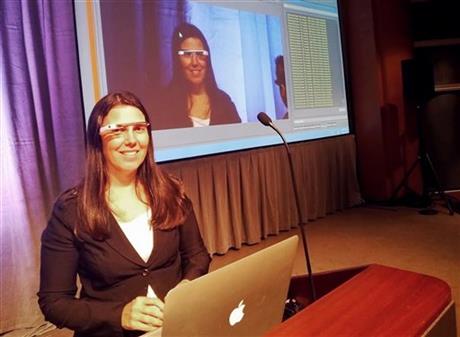By JUSTIN PRITCHARD
This undated photo released courtesy Cecilia Abadie shows Cecilia Abadie a software developer from Temecula, Calif., during a presentation. Abadie was pulled over for speeding on Tuesday Oct. 29, 2013, in San Diego, when a California Highway Patrol officer noticed she was wearing Google Glass and tacked on a citation usually given to drivers who may be distracted by a video or TV screen. (AP Photo/Courtesy Cecilia Abadie)
LOS ANGELES (AP) — An early adopter of Google’s Internet-connected eyeglasses may soon become a guinea pig of a different sort.
Cecilia Abadie was pulled over for speeding Tuesday evening in San Diego, and a California Highway Patrol officer noticed she was wearing Google Glass. The officer tacked on a citation usually given to drivers who may be distracted by a video or TV screen.
Abadie plans to contest what may be a first-of-its-kind citation, and in doing so push authorities on the question of how to regulate evolving gadgetry that will one day be mainstream.
The eyeglasses, which are not yet widely available to the public, feature a hidden computer and a thumbnail-size transparent display screen above the right eye. Users can scan maps for directions — as well as receive web search results, read email and engage in video chats — without reaching for a smartphone.
Abadie, a software developer, told The Associated Press that she was not using her Google Glass when she was pulled over.
It’s unclear whether a citation for Google Glass has been issued before.
Abadie said she is surprised that wearing the glasses would be illegal and that she’s “pretty sure” she will fight the ticket.
“The law is not clear, the laws are very outdated,” Abadie said, suggesting that navigating with the device could be less distracting than with a GPS device or phone.
Though Google Glass users can continue looking ahead, by glancing at the screen they still divert attention from the roadway and that can make the headgear dangerous, according to David Strayer, director of the University of Utah’s Center for the Prevention of Distracted Driving.
Legislators in at least three states — Delaware, New Jersey and West Virginia — have introduced bills that would ban driving with Google Glass.
A spokesman for Google did not reply to a request for comment. On its website, Google says this about using the headgear while driving: “Read up and follow the law. Above all, even when you’re following the law, don’t hurt yourself or others by failing to pay attention to the road.”
About 10,000 units of the glasses have been distributed so far in the United States to “pioneers,” and this week Google announced another 30,000 would be available for $1,500 apiece.




